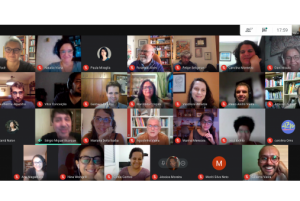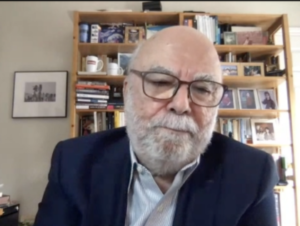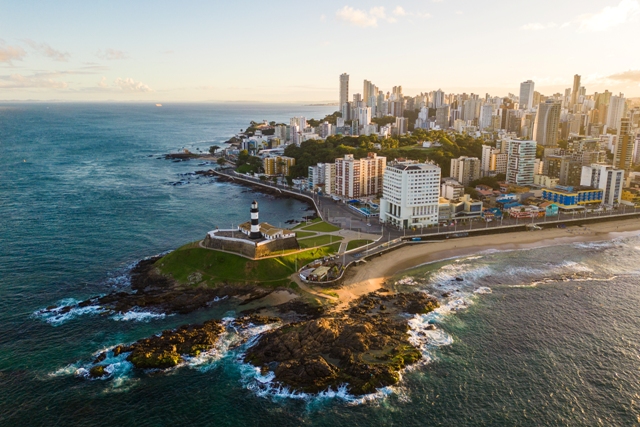By Marina Estarque
On June 7, the National Press Freedom Day in Brazil, journalists in the country had another reason to celebrate. A group of 30 innovative, independent online journalism organizations committed to diversity and democracy took advantage of this date to officially launch Ajor – the Digital Journalism Association.
The launch was announced during the Ibero-American Colloquium on Digital Journalism, organized by the Knight Center for Journalism in the Americas, which has been helping to form Ajor since August 2020.
The original idea of creating the association was born from the digital native journalistic organizations that carried out Festival 3i – Inspiring, Innovative and Independent Journalism.

Ajor is founded by the following organizations: Agência Amazônia Real; Agência Mural; Agência Saiba Mais; Alma Preta; data_labe; Eco Nordeste; Énois Laboratório de Jornalismo; Gênero e Número; InfoAmazonia; Instituto O Joio e O Trigo; JOTA; MyNews; Nexo Jornal; Nós, mulheres da periferia; Periferia em Movimento; Plural; Portal Catarinas; Projeto #Colabora; Repórter Brasil e Revista Afirmativa.

Ajor comes at a time when digital outlets are multiplying, gaining space and recognition in the country. In this context, the association’s main mission is to strengthen Brazilian digital journalism.
The release also highlighted that more than 20 of the 30 founding organizations have women and Black journalists in leadership positions. Diversity also appears in the plurality of members, with “associates in all regions of the country, with different business models and types of content production.”
“The organizations that are part of Ajor have been leading innovation in Brazilian journalism for some years – they are grant winners, are being sought by accelerators and appear on lists of ‘start-ups to keep an eye on” and every year they appear among the main journalistic awards from Brazil and the world.
These organizations need an entity that represents their interests, fosters this innovative journalism and defends democracy at this crucial moment in history,” the first president of Ajor, Natalia Viana, executive director of Agência Pública, told LatAm Journalism Review (LJR).
“Ajor was born with a historic task in Brazil: to consolidate emerging media to allow greater diversity in journalism in an environment that has always been highly concentrated”, Viana added.
Maia Fortes, executive secretary of Ajor, said that the variety of members is one of the strengths of the association.
“Ajor was born aware of the main challenges faced by Brazilian digital journalism and proposes to respond to them on different fronts, strengthening initiatives that expand access to quality information for society.
The organizers of Festival 3i started to talk about Ajor during the last edition of the journalism conference in Rio de Janeiro in November 2019.
In August 2020, directors of the organizations represented on the board of trustees of the Festival 3i started to hold regular virtual meetings to build Ajor and later invited other organizations to participate in the project. The Knight Center for Journalism in the Americas has participated since the beginning of this process, helping with the creation and structuring of Ajor.

“We were very honoured” when Festival 3i’s board of trustees invited us to help build Ajor,” said Professor Rosental Alves, founder and director of the Knight Center.
“Since that invitation, we helped in whatever way possible, using our experience of having helped journalists form other organizations throughout Latin America, such as Abraji, in Brazil; FOPEA, in Argentina; and Consejo de Redacción, in Colombia, among others.”
Activities and New Members
On the Ajor website, some of the conditions that the media outlet must meet to be able to apply are described, in addition to the ranges of financial contribution to which members must commit (it is possible to obtain an exemption).
As a member, the media outlet is entitled to certain benefits, such as participating in activities and events and taking advantage of partnerships with educational organizations and technology companies.
Since before the launch, one of the activities that have been promoted within Ajor is Conversas em Off, secret biweekly meetings to discuss strategic business issues and seek solutions based on the experiences of each member.
The members also have a WhatsApp and email group, in addition to a newsletter, which will include information, among other things, about opportunities, awards and financing notices.
Ajor also maintains Momentos de Escuta, aimed at discussing good diversity practices, as well as a Tech Community, composed by the members’ technology teams, with a focus on digital security – the community shares challenges, thinks about joint solutions and supports members who do not have permanent IT staff.
Assistance is also provided in the search for legal support in case of abusive proceedings against members. On the website, Ajor said that it already has a partnership with Rede Liberdade and is looking for other organizations to expand this network of legal assistance.
Marina Estarque is a Brazilian journalist living in São Paulo. She has worked for Brazilian news organizations such as Folha de S.Paulo, O Estado de S. Paulo, O Dia and the fact-checking agency Lupa. Marina was a correspondent in Brazil for the German international broadcaster Deutsche Welle and a radio reporter for DW Africa in Germany. She also worked as a reporter for United Nations Radio, in New York, and for Spanish newspaper La Voz de Galicia. Marina graduated in Journalism from the Federal University of Rio de Janeiro and has a Master’s degree in Editorial Journalism from the University of A Coruña (Spain).
This article was originally published in Latam Journalism Review , a Knight Center project for journalism in the Americas / University of Texas.
Read also
https://mediatalks.uol.com.br/en/2021/05/27/international-center-for-journalists-awards-brazilian-journalist/













